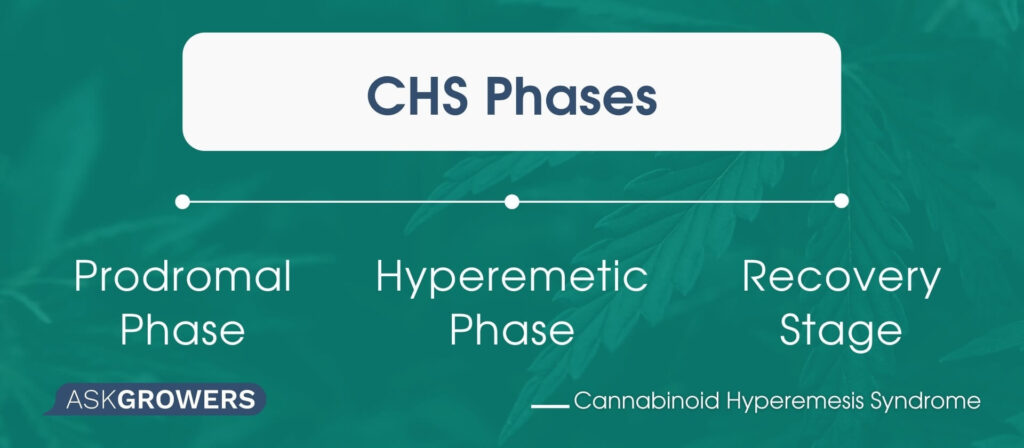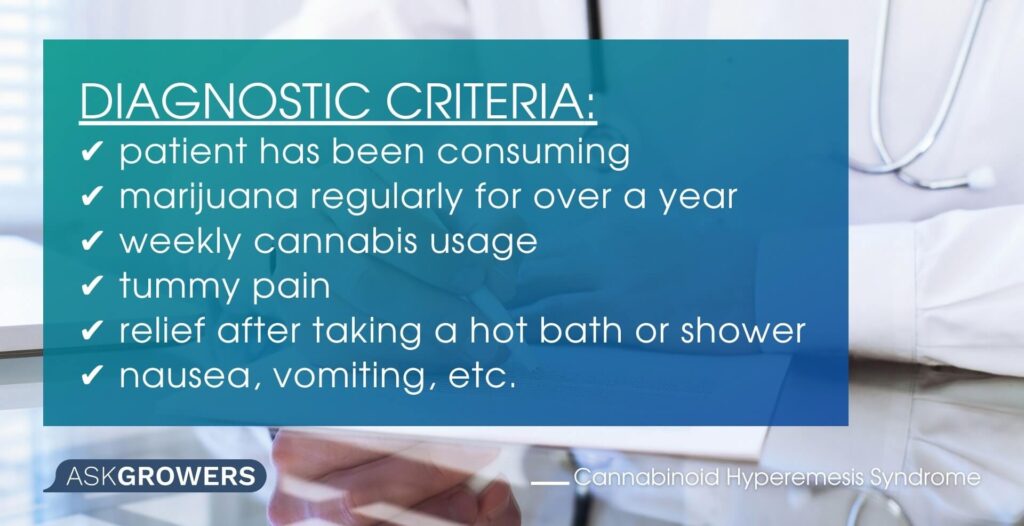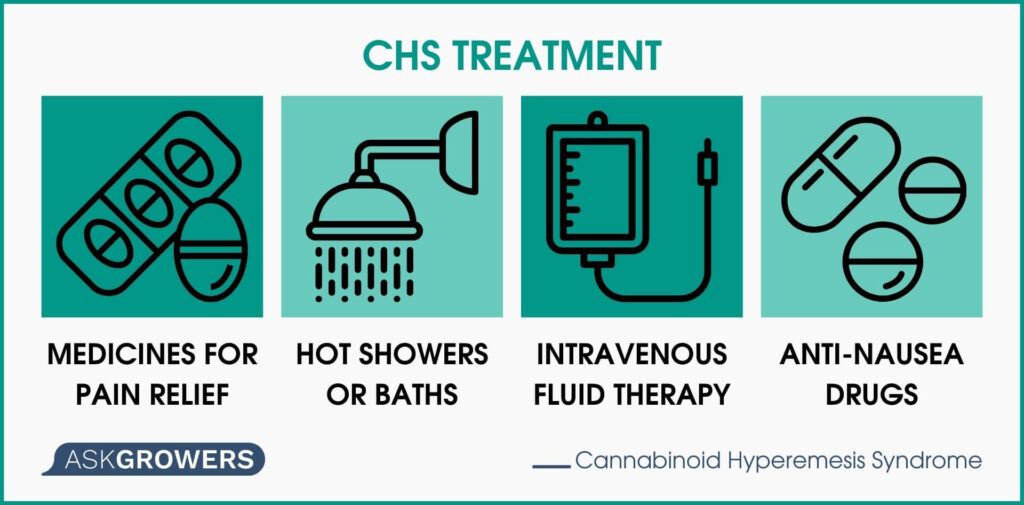Business
Cannabinoid Hyperemesis Syndrome: What Causes It And How To Treat It

When the syndrome develops, which takes a few years, the consumer will experience various problems such as nausea, vomiting, weight loss, and disturbed eating patterns.
Daily and long-term use of cannabis can cause a rare condition known as cannabinoid hyperemesis syndrome (CHS). Symptoms include nausea and an unsettled stomach, to name just a few.
Many researchers tried to give more details on CHS and its causes, but it requires more studies as it is a fairly new condition. The first cases were reported in 2004 in South Australia, where doctors started treating cannabis users for vomiting, stomach pain, and more. The people who experienced these issues were long-term cannabis users.
Diagnosing the condition is often tricky, considering that many users go for treatment without mentioning using marijuana. In most cases, the symptoms disappear entirely once the user stops consuming cannabis. However, as legalization is still in progress, the number of people using marijuana is increasing, and so is the number of those with CHS.
CHS is a rare phenomenon. In most cases, it occurs in people who use marijuana for years (usually 1-5), a few times per day (3-5 times).
Main Causes of Cannabis Hyperemesis Syndrome
Some research suggests that cannabis hyperemesis syndrome is caused by the daily and long-term use of marijuana. The number of people diagnosed with CHS is increasing due to more states in the US legalizing marijuana. However, the number of regular users who develop weed sickness is not high. Some studies suggest that genetics plays a part. There is a lack of evidence that would fully support the current theories around CHS, which is why further research is necessary.
Cannabis has several active components, and since it is very complex, it affects every user differently. One of its main ingredients is THC that features anti-nausea effects. But what has been noted is that if someone uses cannabis regularly for an extended period, the results could be the opposite. Some theories suggest that THC can make cannabinoid receptors act contrary to how they should behave. As a result, the consumer may experience cramps, vomiting, stomach pain, and other issues.
CHS Symptoms and Phases
The symptoms of CHS are divided into three main phases. The first is called the prodromal phase, the second is hyperemetic, and the third is the recovery phase.

Prodromal Phase
The prodromal phase is the first one, and the symptoms in this stage are usually abdominal pain, morning nausea, and urge to vomit. Other symptoms can be skin flushing, body temperature changes, and sweating. While this phase is on, most people will continue to eat normally. In addition, most users will continue to consume cannabis, thinking it will help them stop nausea and vomiting. The prodromal stage can last for a long time, in some cases for a couple of weeks, months, and even years.
Hyperemetic Phase
The second stage is called the hyperemetic phase, and during it, the vomiting is often pretty intense. To ease nausea, people will mostly use hot showers throughout the day. Some people take marijuana to ease nausea, but it only makes the situation worse.
The symptoms in this phase include feeling sick and nauseous, throwing up after smoking weed, dehydration, stomach pain, disturbance of eating patterns, reduced food intake, and weight loss. The syndrome represents a real medical issue. Extreme vomiting and intense tummy pain can plausibly lead to scromiting (the combination of screaming and vomiting). The phase lasts until the consumer stops with marijuana usage.
Recovery Stage
The last of three phases is the recovery stage. It starts the moment the user stops consuming cannabis. During this phase, all the symptoms will go away, and the person will go back to the standard eating patterns. In addition, people in the recovery phase generally feel better. The need for several hot showers or baths throughout the day will disappear as well. The stage can last from a couple of days to a few months. If an individual decides to turn back to marijuana by any chance, the symptoms will most likely return.
Diagnosis of the Sickness
Various health issues can cause repeated vomiting, and what needs to be pointed out is that CHS is a rare condition. The healthcare provider will ask the patient about the symptoms, and it will also ask about past health and issues if there were any. Then, a physical exam is necessary, including a stomach exam.

One of the things that can make the diagnosis faster and a lot simpler is admitting the consumption of marijuana to the doctor. For many health care providers, diagnosing the syndrome can be pretty challenging and can take a lot of time and effort. The main reason for that is that the patient does not report and mention their use of cannabis.
There are specific criteria to diagnose the syndrome. The first one is the patient has been consuming marijuana regularly for over a year. Some other things that can play a significant role are weekly cannabis usage, tummy pain, relief after taking a hot bath or shower, nausea, vomiting, etc. Other things that are considered are morning nausea, age (if the person is younger than 50), weight loss, and disturbed eating patterns.
Cannabinoid Hyperemesis Syndrome Treatment
If the health care provider diagnoses the CHS, it will be explained to the patient what is cannabinoid hyperemesis syndrome, and then it is the treatment time.
One of the first steps doctors suggest is to stop consuming marijuana. If a person experiences extreme vomiting and nausea, hospitalization that may last a few days could be necessary.

During the second phase, known as the hyperemesis phase, the patient might need treatment, such as:
- Medicines for pain relief and anti-sickness
- Constant hot showers or baths
- Intravenous fluid replacement
- Anti-nausea drugs
All of the above are short-term treatments. The only option to treat the condition long-term is to stop using marijuana.
In most cases, the symptoms of the syndrome will disappear pretty fast. The patient may feel much better in general within a few days, usually one or two. However, the symptoms can come back if the person starts consuming cannabis again.
Prevention and Consequences If Untreated
The only way to prevent cannabinoid hyperemesis syndrome is the complete absence of marijuana consumption. Unfortunately, people tend to consume cannabis for years and become chronic users before the CHS develops. That’s because the development of the syndrome takes a lot of time.
When a person has the symptoms, especially vomiting, it may cause additional issues such as dehydration. In addition, if the condition is not treated, some other complications may arise, such as weakness, muscle spasms, shock, to name a few. In the most severe cases, cannabinoid hyperemesis syndrome can lead to kidney failure that can cause death.
Conclusions
CHS is caused by regular marijuana consumption. When the syndrome develops, which takes a few years, the consumer will experience various problems such as nausea, vomiting, weight loss, disturbed eating patterns, etc. The symptoms take three phases, and they can be extremely severe, especially in phase two.
The diagnosis of the syndrome is one of the trickiest parts of the story because people often fail to report using marijuana to their health care providers. Once the syndrome is finally diagnosed, the patient gets familiar with the condition, learns what CHS is, and begins treatment. The most important part of the recovery process is the stopping of weed consumption. If the patient continues to consume, the symptoms will come back.
The condition is a rare phenomenon and it does not affect all smokers. Every marijuana user should know the right dose. When the marijuana consumer experiences extreme vomiting for one whole day or more, contacting a health care provider is the best possible option.
Disclaimer: The information in this article is for educational purposes only and should not be used as a substitute for any prescribed medication. See your doctor first!
Business
New Mexico cannabis operator fined, loses license for alleged BioTrack fraud

New Mexico regulators fined a cannabis operator nearly $300,000 and revoked its license after the company allegedly created fake reports in the state’s traceability software.
The New Mexico Cannabis Control Division (CCD) accused marijuana manufacturer and retailer Golden Roots of 11 violations, according to Albuquerque Business First.
Golden Roots operates the The Cannabis Revolution Dispensary.
The majority of the violations are related to the Albuquerque company’s improper use of BioTrack, which has been New Mexico’s track-and-trace vendor since 2015.
The CCD alleges Golden Roots reported marijuana production only two months after it had received its vertically integrated license, according to Albuquerque Business First.
Because cannabis takes longer than two months to be cultivated, the CCD was suspicious of the report.
After inspecting the company’s premises, the CCD alleged Golden Roots reported cultivation, transportation and sales in BioTrack but wasn’t able to provide officers who inspected the site evidence that the operator was cultivating cannabis.
In April, the CCD revoked Golden Roots’ license and issued a $10,000 fine, according to the news outlet.
The company requested a hearing, which the regulator scheduled for Sept. 1.
At the hearing, the CCD testified that the company’s dried-cannabis weights in BioTrack were suspicious because they didn’t seem to accurately reflect how much weight marijuana loses as it dries.
Company employees also poorly accounted for why they were making adjustments in the system of up to 24 pounds of cannabis, making comments such as “bad” or “mistake” in the software, Albuquerque Business First reported.
Golden Roots was fined $298,972.05 – the amount regulators allege the company made selling products that weren’t properly accounted for in BioTrack.
The CCD has been cracking down on cannabis operators accused of selling products procured from out-of-state or not grown legally:
- Regulators alleged in August that Albuquerque dispensary Sawmill Sweet Leaf sold out-of-state products and didn’t have a license for extraction.
- Paradise Exotics Distro lost its license in July after regulators alleged the company sold products made in California.
Golden Roots was the first alleged rulebreaker in New Mexico to be asked to pay a large fine.
Source: https://mjbizdaily.com/new-mexico-cannabis-operator-fined-loses-license-for-alleged-biotrack-fraud/
Business
Marijuana companies suing US attorney general in federal prohibition challenge

Four marijuana companies, including a multistate operator, have filed a lawsuit against U.S. Attorney General Merrick Garland in which they allege the federal MJ prohibition under the Controlled Substances Act is no longer constitutional.
According to the complaint, filed Thursday in U.S. District Court in Massachusetts, retailer Canna Provisions, Treevit delivery service CEO Gyasi Sellers, cultivator Wiseacre Farm and MSO Verano Holdings Corp. are all harmed by “the federal government’s unconstitutional ban on cultivating, manufacturing, distributing, or possessing intrastate marijuana.”
Verano is headquartered in Chicago but has operations in Massachusetts; the other three operators are based in Massachusetts.
The lawsuit seeks a ruling that the “Controlled Substances Act is unconstitutional as applied to the intrastate cultivation, manufacture, possession, and distribution of marijuana pursuant to state law.”
The companies want the case to go before the U.S. Supreme Court.
They hired prominent law firm Boies Schiller Flexner to represent them.
The New York-based firm’s principal is David Boies, whose former clients include Microsoft, former presidential candidate Al Gore and Elizabeth Holmes’ disgraced startup Theranos.
Similar challenges to the federal Controlled Substances Act (CSA) have failed.
One such challenge led to a landmark Supreme Court decision in 2005.
In Gonzalez vs. Raich, the highest court in the United States ruled in a 6-3 decision that the commerce clause of the U.S. Constitution gave Congress the power to outlaw marijuana federally, even though state laws allow the cultivation and sale of cannabis.
In the 18 years since that ruling, 23 states and the District of Columbia have legalized adult-use marijuana and the federal government has allowed a multibillion-dollar cannabis industry to thrive.
Since both Congress and the U.S. Department of Justice, currently headed by Garland, have declined to intervene in state-licensed marijuana markets, the key facts that led to the Supreme Court’s 2005 ruling “no longer apply,” Boies said in a statement Thursday.
“The Supreme Court has since made clear that the federal government lacks the authority to regulate purely intrastate commerce,” Boies said.
“Moreover, the facts on which those precedents are based are no longer true.”
Verano President Darren Weiss said in a statement the company is “prepared to bring this case all the way to the Supreme Court in order to align federal law with how Congress has acted for years.”
While the Biden administration’s push to reschedule marijuana would help solve marijuana operators’ federal tax woes, neither rescheduling nor modest Congressional reforms such as the SAFER Banking Act “solve the fundamental issue,” Weiss added.
“The application of the CSA to lawful state-run cannabis business is an unconstitutional overreach on state sovereignty that has led to decades of harm, failed businesses, lost jobs, and unsafe working conditions.”
Business
Alabama to make another attempt Dec. 1 to award medical cannabis licenses

Alabama regulators are targeting Dec. 1 to award the first batch of medical cannabis business licenses after the agency’s first two attempts were scrapped because of scoring errors and litigation.
The first licenses will be awarded to individual cultivators, delivery providers, processors, dispensaries and state testing labs, according to the Alabama Medical Cannabis Commission (AMCC).
Then, on Dec. 12, the AMCC will award licenses for vertically integrated operations, a designation set primarily for multistate operators.
Licenses are expected to be handed out 28 days after they have been awarded, so MMJ production could begin in early January, according to the Alabama Daily News.
That means MMJ products could be available for patients around early March, an AMCC spokesperson told the media outlet.
Regulators initially awarded 21 business licenses in June, only to void them after applicants alleged inconsistencies with how the applications were scored.
Then, in August, the state awarded 24 different licenses – 19 went to June recipients – only to reverse themselves again and scratch those licenses after spurned applicants filed lawsuits.
A state judge dismissed a lawsuit filed by Chicago-based MSO Verano Holdings Corp., but another lawsuit is pending.
Source: https://mjbizdaily.com/alabama-plans-to-award-medical-cannabis-licenses-dec-1/
-

 Business2 years ago
Business2 years agoPot Odor Does Not Justify Probable Cause for Vehicle Searches, Minnesota Court Affirms
-

 Business2 years ago
Business2 years agoNew Mexico cannabis operator fined, loses license for alleged BioTrack fraud
-

 Business2 years ago
Business2 years agoAlabama to make another attempt Dec. 1 to award medical cannabis licenses
-

 Business2 years ago
Business2 years agoWashington State Pays Out $9.4 Million in Refunds Relating to Drug Convictions
-

 Business2 years ago
Business2 years agoMarijuana companies suing US attorney general in federal prohibition challenge
-

 Business2 years ago
Business2 years agoLegal Marijuana Handed A Nothing Burger From NY State
-

 Business2 years ago
Business2 years agoCan Cannabis Help Seasonal Depression
-

 Blogs2 years ago
Blogs2 years agoCannabis Art Is Flourishing On Etsy













